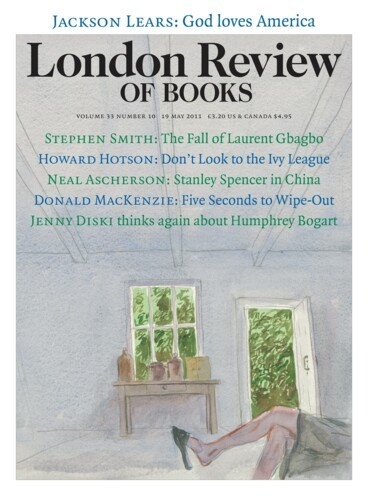If the polls are right, the ANC will suffer its worst ever electoral reverse in the local elections due to be held in South Africa on 18 May. The main opposition party, the Democratic Alliance, seems poised to win not only Cape Town, its main base, but to gain seats right across the country. In the Western Cape the DA will probably win a majority of towns and cities; it will make inroads in the Northern Cape and could even evict the ANC from its Eastern Cape stronghold of Port Elizabeth. The ANC’s corruption and maladministration have demoralised even its own activists, but the other main reason for its plight is the decisive movement towards the DA of both the country’s 1.3 million Indians and, especially, the mixed-race Coloureds, the predominant group in the Western and Northern Cape. At last a more competitive party system seems possible in South Africa.
In the run-up to the election the government tabled an Employment Equity Bill requiring affirmative action in the labour market to be based on national, not regional demographics. Given the concentration of Indians in KwaZulu-Natal and of Coloureds in the Western Cape, the government’s aim could be achieved only if 300,000 Indians left their jobs in KwaZulu-Natal and a million Coloureds resigned from theirs in the Western Cape. Most assumed this was merely clumsy drafting until a video emerged of an interview last year in which Jimmy Manyi, then director-general of the Department of Labour and now the chief government spokesman, explained that the bill meant exactly what it said. Coloureds, Manyi declared, were ‘over-concentrated in the Western Cape’.
This did not come out of the blue. Manyi was already well known as a proponent of Africanist hegemony, a tendency that has become stronger the longer the ANC has been in power. Manyi’s remarks caused a storm. Trevor Manuel, the cabinet’s leading Coloured member, who had already been given the impossible job of bringing his community back to the ANC, denounced Manyi as ‘a racist in the mould of H.F. Verwoerd’. Manyi’s own spokesman put out a pro forma apology but no move was made to change the bill. Manuel was denounced by some ANC elders for his outburst and Manyi kept his job.
For many Coloureds this was the last straw. The latest polls show the Coloured vote breaking at least 3:1 in favour of the DA, a party led by a white, Helen Zille. (The DA is Helen Suzman’s old party.) This is remarkable. In Cape Town both mayoral candidates, the DA’s Patricia de Lille and the ANC’s Tony Ehrenreich, are Coloured. Ehrenreich, a Marxist and trade unionist, makes great play of appealing to ‘the working class and the poor’ but it is precisely Coloured workers, including trade-union members, who are the most solid supporters of the DA. Among Indians and Coloureds ANC supporters tend to be Muslims, and relatively wealthy, a fact not unconnected to government patronage networks. (Around 5 per cent of Coloureds are Muslims.) Naturally, both the DA and ANC make great play of their non-racialism.
One of the striking things about the Manyi incident is that it seems to perpetuate all the old apartheid stereotypes about the separateness of different racial groups. ‘When I fought in the struggle against apartheid, I felt I had lost my Coloured identity and that the whole point was that we were all just South Africans,’ Rhoda Kadalie told me. ‘But the ANC has made me a Coloured again. When I speak now, I am a Coloured spokesperson.’ Her grandfather, Clements Kadalie, is one of the great figures of the struggle. In the 1920s he founded the Industrial and Commercial Workers Union, the largest black trade union in Africa, for which he was endlessly harassed and persecuted. When the ANC came to power Rhoda Kadalie was appointed to senior positions but she is now a DA stalwart, furious at ANC corruption. ‘The ANC has always had problems with Coloured intellectuals,’ she says. ‘We’re too bloody independent.’ Helen Zille has been keen to give her a party job, but she is too suspicious of politicians to accept. ‘Not long ago,’ she told me, ‘the ANC invited leading Coloureds to a big meeting to discuss why we had wandered away from the ANC. Pallo Jordan, the minister of arts and culture until 2009, took the chair and every time we explained our views he would tell us that we were all victims of false consciousness. Apparently none of our grievances properly existed. We all went away and held a meeting at a private house, where we decided that the only thing to do was to tell the ANC to fuck right off.’ One senses that it wouldn’t take much for Coloured intellectuals to say the same to everyone. Their complicated history has left layers of distrust, even of their own. When, ten years ago, I carried out a poll among Coloureds of their political heroes they chose F.W. De Klerk and the ANC secretary-general, Cyril Ramaphosa. Coloured leaders like Allan Boesak came nowhere.
The Coloureds are more and more of a force to be reckoned with. A million whites have emigrated since 1994, leaving just 4.47 million in the country. There are 4.43 million Coloureds. The current elections will see a Coloured mayor in Cape Town, ‘the mother city’, replacing another Coloured mayor, Dan Plato. The Coloureds were responsible for one of the most important creole languages, Afrikaans, and they point the way to a creole future, here in South Africa and probably elsewhere too.
Send Letters To:
The Editor
London Review of Books,
28 Little Russell Street
London, WC1A 2HN
letters@lrb.co.uk
Please include name, address, and a telephone number.

